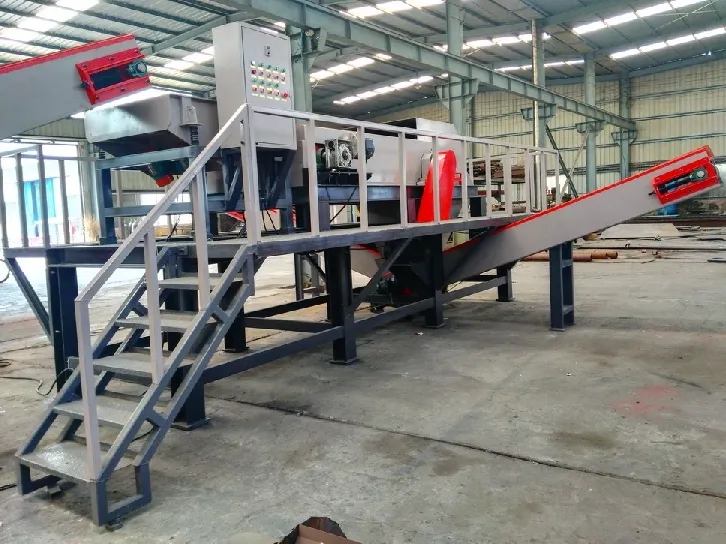

डिस . 09, 2024 21:17 Back to list
Understanding Construction Waste Crushers A Sustainable Approach to Recycling
In the modern world, where urbanization and infrastructural development are rampant, the challenge of managing construction waste has become a pressing concern. Construction activities inevitably generate a significant amount of waste, which not only occupies landfills but also poses environmental threats. To combat this issue, construction waste crushers have emerged as an innovative solution, enabling the recycling of materials while promoting sustainability in the industry.
The Importance of Construction Waste Management
Construction and demolition (C&D) activities contribute to a considerable portion of waste generated worldwide. Estimates suggest that C&D waste can account for approximately 30% to 50% of total municipal solid waste. This includes materials such as concrete, bricks, wood, metal, and asphalt, many of which can be recycled and reused. Neglecting proper waste management practices can lead to significant environmental consequences, including pollution, resource depletion, and unnecessary landfill usage.
Proper management not only conserves natural resources but also reduces the carbon footprint associated with transporting waste. Therefore, investing in recycling technologies like construction waste crushers can have lasting benefits for both the environment and the economy.
What is a Construction Waste Crusher?
A construction waste crusher is a specialized machinery designed to crush and process debris generated from various construction activities. These machines efficiently break down materials such as concrete, bricks, asphalt, and wood into smaller, manageable pieces. The resulting material can be repurposed for use in new construction projects, landscaping, or other applications, promoting a circular economy.
There are various types of crushers used for construction waste, including jaw crushers, impact crushers, and cone crushers. Each type serves a specific purpose and is optimized for different materials, ensuring effective breakdown and minimal loss of quality.
Benefits of Using Construction Waste Crushers
1. Resource Conservation The primary benefit of using construction waste crushers is the opportunity to recycle materials. By converting waste back into usable resources, these machines help conserve raw materials and reduce the need for new resource extraction.
2. Cost Efficiency Recycling construction debris can significantly cut costs associated with waste disposal. Transportation of waste to landfills can be expensive, and reusing materials can reduce the overall budget for new construction projects.

3. Environmental Protection Construction waste crushers contribute to a cleaner environment by minimizing landfill waste and reducing the carbon emissions associated with waste management processes. Recycling lessens the need for new materials to be processed, further contributing to reduced environmental impact.
4. Compliance with Regulations Many governments and municipalities are increasingly enforcing regulations regarding waste management and recycling. Construction waste crushers provide a compliant solution that meets these legal requirements, helping companies avoid potential fines and penalties.
5. Flexibility and Convenience Modern construction waste crushers can be mobile, allowing them to be transported to different job sites. This flexibility enables construction companies to address waste as it arises, streamlining operations and improving efficiency.
How to Choose the Right Construction Waste Crusher
Selecting the appropriate construction waste crusher is essential for maximizing efficiency and output. Here are a few factors to consider
- Material Type Understanding the types of materials you will be processing is crucial, as various crushers are designed for specific materials. For example, a jaw crusher may be ideal for concrete, while an impact crusher may be better suited for softer materials.
- Output Capacity Depending on the scale of your operations, choosing a crusher with suitable output capacity is important. Ensure that the machine can handle your expected volume of construction waste.
- Technology and Features Look for crushers equipped with modern technology that enhances efficiency and ease of use. Features such as automated controls, ease of maintenance, and energy efficiency can make a significant difference.
Conclusion
As the construction industry continues to flourish, the need for efficient and sustainable waste management solutions becomes increasingly vital. Construction waste crushers present a practical and eco-friendly option for recycling materials, conserving resources, saving costs, and protecting the environment. By adopting these technologies, construction companies can not only improve their operational efficiency but also contribute to the sustainable development of our urban landscapes, creating a greener future for all.
Latest news
Troubleshooting Common Eddy Separator Problems
NewsJul.04,2025
The Role of Metal Recycling Plants in Circular Economy
NewsJul.04,2025
The Impact of Recycling Line Pickers on Waste Management Costs
NewsJul.04,2025
Safety Features Every Metal Shredder Should Have
NewsJul.04,2025
How Industrial Shredders Improve Waste Management Systems
NewsJul.04,2025
How Cable Granulators Contribute to Sustainable Recycling
NewsJul.04,2025